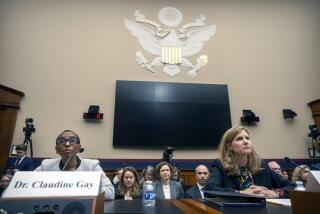Language in Exile
- Share via
Yiddish has long been a language hidden in plain sight. Almost everyone knows a little, a word or two, a joke perhaps, but what do they really know of the history, the tragedies and bitter controversies that characterized a language now on the U.N.’s endangered list but once spoken by 11 million people, three-quarters of the world’s Jews, a tongue whose story, Miriam Weinstein claims, is “perhaps unique .... No other language has been so adored, so despised, so ostentatiously ignored.”
Part of the problem has been the lack of a serious yet accessible book to fill the gap between glib entertainments like Leo Rosten’s “The Joys of Yiddish” and Max Weinreich’s magisterial, multivolume “History of the Yiddish Language.” Weinstein’s “Yiddish: A Nation of Words” aims to do that, and her success, though not total, is substantial.
Given her subject, a language that has struggled for almost its entire 1,000-year history to gain respect, it’s ironic that the book’s weakness is its own reluctance to take itself seriously. Determined to be a user-friendly author, Weinstein has a soft spot for cutesy good cheer, force-feeding the reader on glib wisecracks and pseudo-Yiddishisms like “you should be so lucky.”
And proverbs; don’t ask about the proverbs. It seems as if there’s one on every page, enough to drown us in wry folk wisdom.
Yet, like the language, “Yiddish” proves surprisingly resilient. When Weinstein drops these annoying tendencies and concentrates on her story, the formidable amount of research she’s done, her facility with thumbnail biographies as well as the justifiable anger she feels about Yiddish’s treatment combine to give the book considerable worth.
“No other people,” she first says and then demonstrates, “has ever squandered its national treasures in the way that Jews have done by resigning from Yiddish.”
Though it’s often erroneously considered a corrupt form of German, Yiddish is more accurately described as a fusion language, which, though originating between 900 and 1100 in western Germany, eventually came to contain words from Slavic and Romance languages as well as being between 10% and 20% Hebrew. Always the humble language of the everyday, Yiddish had a symbiotic relationship with that sacred language of prayer and study.
It functioned, Weinstein says, “as keeper of a distinct and viable world. It kept outsiders out; it solidified the group within; it formed a protective layer around holy Hebrew, its core.”
When things got bad for the Jews, they retreated to its safety; when the situation improved, they often used Yiddish as a way to open a window onto the secular world.
Because the language’s status and usage are inextricably linked to what was happening to Jews on Europe’s stage, “Yiddish” inevitably ends up doing double duty, providing brief snapshots of the continent’s Jewish history which serve as backdrop for the language’s changes of fortune.
In the 18th century, the European Enlightenment offered secular opportunities for Jews, but thinkers like the German Moses Mendelssohn (grandfather of the composer Felix) believed these could best be taken advantage of if Yiddish (called “mutilated and unintelligible” by one of his followers) was discarded. Even its greatest literary figures, from Sholem Abramovitsch to Sholem Aleichem, had come to the language with some reluctance.
The end of the 19th century saw the birth of several movements that had a powerful impact on Yiddish. There was Zionism and its quest for a Jewish homeland; Bundism, devoted to the Jewish proletariat; and a fascinating, less well-known philosophy called golus nationalism (after the Yiddish word for exile), which posited that “if the Jews wanted to become a nation among nations, they would have to establish an official, spoken, common tongue. The obvious candidate was Yiddish.”
Even after 1908’s landmark Czernowitz conference established Yiddish as a Jewish national language, however, die-hard Zionists wanted to converse in Hebrew. This even though, as author Maurice Samuel said, “To speak Hebrew is like riding a noble horse; at first exhilarating, then rather uncomfortable, and finally a torture.”
A key figure in changing this was a messianic Russian immigrant to 19th century Palestine who renamed himself Ben-Yehuda and made it his life’s work to turn biblical Hebrew into a modern language.
He and his followers succeeded, but the price his zealous disavowal of Yiddish inflicted on those closest to him as well as anyone who had the temerity to speak the old language in Israel is still unsettling to read about.
In the United States, too, Yiddish was disrespected, considered a barrier to Americanization and worse. Otherwise noble reformers like Jacob Riis contemptuously referred to the language as “jargon, and nothing else,” and Abraham Cahan, the czar who ran the Yiddish-language Daily Forward, took pains to Americanize it. Even the Hebrew taught in this country was uniformly presented with the Israeli Sephardic pronunciation rather than the Yiddish-tinged Ashkenazic one.
What happened in the Soviet Union was even more insidious. Led by anti-religious Yiddish speakers like Esther Frumkin, a Sovietized Yiddish (with the Hebrew element removed) became an officially recognized proletarian language: There was even an unusual Yiddish-speaking autonomous region called Birobidzhan established in the far reaches of Siberia. What Stalin really felt about Yiddish, however, became terrifyingly clear on 1952’s Night of Murdered Jewish Poets, when more than a dozen Yiddish writers were executed.
In today’s world, Yiddish has been increasingly studied and appreciated. Except in ultra-Orthodox communities, however, it will likely never again be a widely spoken tongue. Still, Nobel Prize winner Isaac Bashevis Singer insisted, “Yiddish has not yet said its last word” when he accepted the award in 1978. Lovers of the language, and there are many, can only hope he is right.
More to Read
Sign up for our Book Club newsletter
Get the latest news, events and more from the Los Angeles Times Book Club, and help us get L.A. reading and talking.
You may occasionally receive promotional content from the Los Angeles Times.











